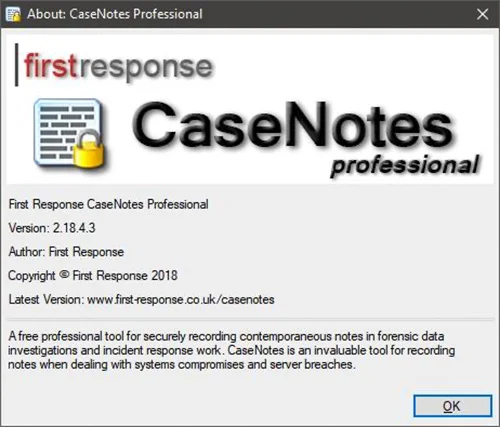This is especially useful as more and more jurisdictions are enforcing regulatory standards for investigations, like ISO17025 in the United Kingdom.
CaseNotes stores your notes, checklists and screen captures in a SQLite database that can optionally be encrypted for additional security. It has been used by thousands of forensic analysts around the world since 2003 – we’re very excited to finally release this new version, which has so many new features, based on user requests.

- Flexible configuration of case meta-data (case details, like the reference number, etc.)
- Secure ‘write-once, read-many’ style of case note data capture and storage
- Full audit trail of case note data entry and metadata edits in a self-contained log
- Spell checker built in, with the ability to add/delete words from the dictionary
- A GUI interface builder for creating multiple checklists
- A templating function for storing text snippets for often entered phrases
- Tamper evident storage of data using internal MD5 hashes for all data entered
- No heavy database technologies – all you need is the program and your SQLite case file
- Use of AES 512bit encryption (optional) to further secure data in sensitive cases
- Storage of configuration information in a user editable text based .xml file
- Support for running multiple copies of CaseNotes at the same time
- Compatible with non-roman and double-byte character sets (Japanese, Russian, Greek, Chinese, Korean, Arabic …)
What CaseNotes is not:
- CaseNotes is NOT a multi-user application – each analyst should keep their own notes in their own Case File even when working on the same investigation. CaseNotes is not designed to support simultaneous multi-user access and bad things will happen if you attempt this – so don’t!
- CaseNotes is NOT a case management system – it’s just for recording your notes – nothing more, nothing less.


